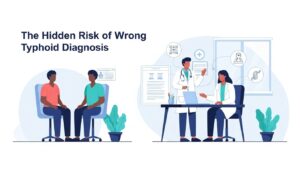One of the main causes of maternal fatalities globally is hypertension in pregnancy, also known as high blood pressure during pregnancy. At Well-Life Hospital, we frequently witness how, if left untreated, this disease can impact both the mother and her fetus. Managing hypertension during pregnancy is essential to protecting both lives and ensuring a healthy, complication-free journey to motherhood. Understanding pregnancy hypertension symptoms, along with being aware of its causes, risk factors, and prevention measures, can help save lives and ensure a successful pregnancy journey.
What Does Pregnancy-Related Hypertension Mean?
Elevated blood pressure that occurs during pregnancy is referred to as hypertension in pregnancy. Understanding pregnancy hypertension symptoms helps in early detection and timely treatment.
There are mostly two kinds:
- Chronic Hypertension: Before conception or throughout the first 20 weeks of pregnancy, the mother had high blood pressure.
- Pregnancy-Induced Hypertension (PIH): This kind appears after 20 weeks of pregnancy and may persist for up to six weeks following delivery.
If treatment is not received, both disorders can cause major problems for both the mother and the unborn child.
Why It’s Important
After bleeding disorders, hypertensive disorders are the second most common cause of maternal death, according to global health data. Reduced blood supply to the placenta, early birth, and potentially fatal complications, including preeclampsia and eclampsia, are all possible outcomes of the condition. Recognizing pregnancy hypertension symptoms early can make a significant difference in outcomes.
Risk Elements
Pregnancy-related hypertension is more common in some women. Your risk could be increased if you:
- Possess a family history of hypertension
- Are obese or overweight
- Have a renal disease before becoming pregnant
- Are expecting twins or more than one child
- Became pregnant at a very young age (adolescence) or above 35
To identify these dangers early, our physicians at Well-Life Hospital constantly advise women to have frequent prenatal exams and pre-pregnancy evaluations.
Is It Possible to Prevent Hypertension During Pregnancy?
Not totally, however, it can be controlled and decreased with early prenatal care and healthy lifestyle choices. Managing hypertension during pregnancy effectively involves consistent medical care, balanced nutrition, and healthy daily habits.
Here are some recommendations from experts:
- Keep your weight in check: ideally, less than 90 kg before conception.
- Attend every prenatal appointment: Frequent examinations aid in the early detection of symptoms.
- Exercise moderately: Light walking or yoga during pregnancy might enhance circulation.
- Avoid self-medication: Always seek advice from your healthcare provider.
- Make sure you get enough sleep and manage your stress.
The Value of Early Identification
Many women don’t realize they have hypertension until it gets worse. Regular monitoring is crucial throughout prenatal care because of this. Knowing pregnancy hypertension symptoms helps women take immediate steps toward treatment and prevention. Following a diagnosis, the pregnancy is classified as “high-risk,” and the woman receives extra care to prevent complications.
Conclusion
Pregnancy-related hypertension is a serious illness, but most women who receive prompt diagnosis and appropriate treatment go on to have successful pregnancies and healthy babies. At Well-Life Hospital, our team of professionals is dedicated to managing hypertension during pregnancy and helping expectant mothers navigate safe, closely monitored pregnancies.
Make an appointment for an antenatal consultation at Well-Life Hospital in Abuja today if you are pregnant or planning to be.






